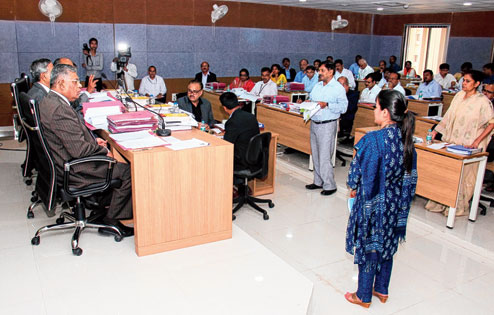Ranchi, Sept. 7: Led by its chairperson former Supreme Court Chief Justice H.L. Dattu, National Human Rights Commission (NHRC), which held its biggest hearing in Jharkhand in recent memory today, recommended a CID probe with a three-month deadline into the deaths of 12 Palamau youths, whom the police allegedly gunned down in a fake encounter in June 2015.


The Palamau case of alleged police atrocity was not the only one to come under the purview of the rights commission's recommendations. Chairperson Justice Dattu, and a three-member panel of Justices Cyriac Joseph and D. Murugesan and S.C. Sinha together heard 15 cases, including the Palamau one, while members individually heard 69 more, taking the total figure of cases heard today to 84.
The full commission hearing of 15 cases started at 11am and continued till noon at the Judicial Academy in Dhurwa. The open hearing, where 69 cases were heard by one member each, followed suit at the same venue.
Among the high-profile open hearing cases, Bhushan Swansi, the bereaved father of Bundu minor boy Rupesh Swansi, who was allegedly beaten to death in police custody in July 2016, was asked to move high court against the guilty policemen. Swansi had come with his two daughters for the hearing.
Chief secretary Rajbala Verma and director-general of police D.K. Pandey were among those present during the hearing for immediate disposal of cases and to respond to any relevant queries of commission.
Though it is not binding for any state to obey the recommendations of the rights panel, it normally does so. Principal secretary to chief minister Sanjay Kumar, when asked on NHRC recommendations, said: "Government will follow them with utmost seriousness as it is very concerned about upholding human rights in the state."
But, many people, whose grievances are listed with the NHRC but were not included for hearing in Ranchi, went home disappointed.
Among the unhappy ones were some youths who had over five years ago impersonated themselves as Maoists to stage a surrender allegedly on the orders of police and security personnel in lieu of paramilitary jobs.
The case of 2011-12, in which over 500 innocent tribal youths faked surrenders to make security forces look good, was one of the state's most embarrassing moments.
"We expected our case to be heard here but it was not listed," said Motilal Sahu, a youth from Gumla who had faked a surrender and spent over Rs 1.5 on paramilitary training. "We will have to pursue our case in Delhi (NHRC headquarters)," he said.
Kishore Rajak from Hiranpur in Pakur alleged the powerful liquor mafia had killed his 17-year-old son Amar and dumped him on railway tracks in April 2011 to make it look like suicide but the police had instead of punishing the culprits, harassed him by implicating him in false cases. "My case is not listed," he rued.
Before the hearings started, Justice Dattu spoke on the increasing ambit of the NHRC, which he said keeps tabs on government welfare schemes, manmade and natural disaster management measures, atrocities against SC and ST persons, social and environmental issues, illegal mining, child labour, bonded labour and many more.
Tomorrow, 12 more cases will be heard by the NHRC by a two-member division bench at Judicial Academy.










